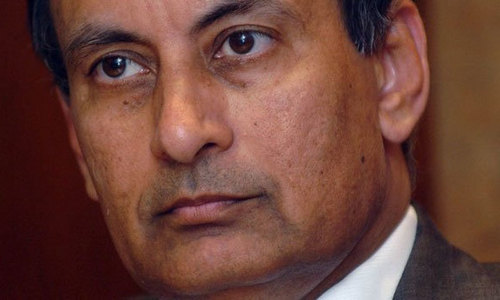Asif Ali Zardari, former president and still PPP boss, has surprised and confounded before. In recent times, Mr Zardari has even surprised his own party with his pronouncements on national politics, institutional relations and the role of the military establishment.
But perhaps never before has Mr Zardari simultaneously stunned the country at large and mystified his own party as he did on Tuesday.
For several frenzied hours two days ago, the media and the political leadership tried to dissect a statement attributed to Mr Zardari in which the former president appeared to call on army chief, Gen Raheel Sharif, to reconsider his decision to retire in November.
It was a bewildering statement and directly contradicted Mr Zardari himself from just a month ago. What was the former president thinking?
The only thing that is clear at this point is that the PPP does not function coherently when its leader is trying to run its affairs from self-exile.
Neither apparently is Mr Zardari himself capable of staying on message when his personal spokesperson, Farhatullah Babar, is not around to vet the former president’s words and opinions.
Desperately for national politics and the PPP itself, the party that was in power at the centre less than three years ago and that still governs Sindh appears to have become a parody of itself.
While Mr Zardari has now disowned the crux of his statement on Tuesday and his party spokespersons have gone into damage control mode, it is worth considering the implications of Mr Zardari’s ruminations on a possible extension for Gen Sharif.
Perhaps most astounding is how unaware Mr Zardari appears to be of his own role in making it possible to have a debate on an army chief’s extension in the first place.
Five years ago, had Mr Zardari not cravenly submitted to a power-hungry Ashfaq Kayani, then army chief on the verge of retirement, it is almost inconceivable that an extension for an army chief in civilian times could be considered today.
It is possible that at the time Mr Zardari had calculated that an extension for Mr Kayani would have ensured the PPP a full term in office, an unprecedented achievement in the massively interrupted democratic history of the country.
Yet, just a few months after the extension was granted, the Memogate controversy rocked the PPP government — and it quickly and abundantly became clear that the targets were none other than Mr Zardari himself and his handpicked ambassador to the US, Husain Haqqani.
Worryingly, Mr Zardari appears to have learnt no lessons from his own and very personal history with extensions and the institutional problems they can cause.
Was Mr Zardari hoping to win a reprieve for his party in Sindh? Or was he hoping to drive a wedge between the federal government and the military leadership? If so, to what end?
Mysterious indeed have become the ways of Asif Ali Zardari.
Published in Dawn, February 26th, 2016
















































